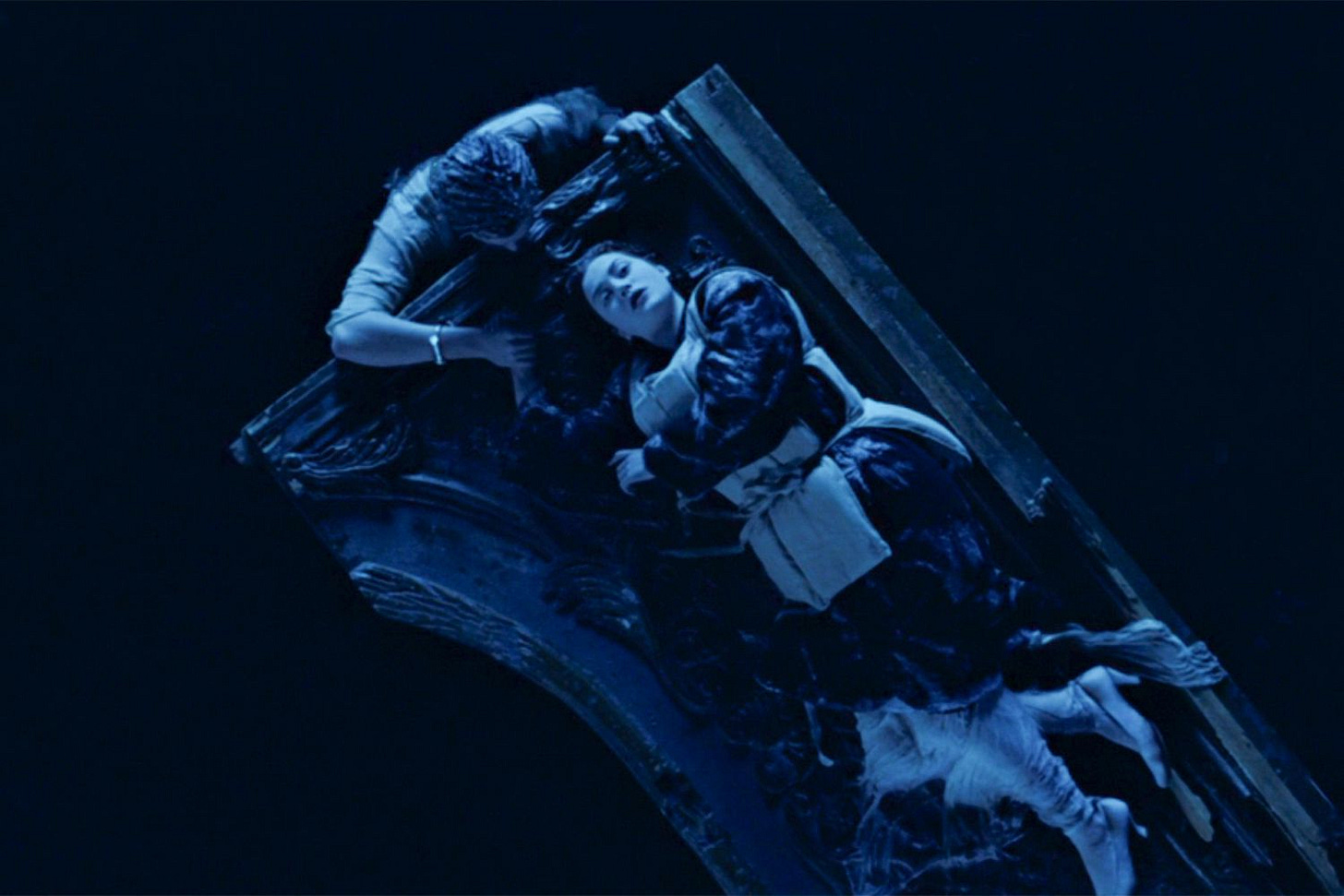I was in 4th grade when Titanic came out—and I was the only kid in my class not allowed to see it (because of all the…*checks notes*…death?). Nonetheless, I was obsessed, reading the kids’ historical fiction, obsessively perusing the making-of book, pretending that I was accompanying the actors on their press tours (fun fact: my elementary library had a copy of the New York Times with a headline of the sinking, and that was a fucking sacred object to me…and me alone). I was not allowed to see the movie until I was twelve—as soon as I did, I was obsessed again, as if the first fixation had never faded. It was so much better than I imagined.
I proceeded to watch the movie more times than I can count. To this day, the only person I know of who quotes Titanic as much as I do is podcaster Sarah Marshall. I am “more of an indoor girl”; when my friends walk away, I shout, “I’ll just wait here"!”; I saw that my clock was off and wondered if I was “in the middle of the North Atlantic.” I quote the big lines; I quote the small lines. I love this movie.
I first suspected the writing was bad, however, pretty early in this relationship: one line just kept poking at me, pestering me. Perhaps you know the line I’m talking about. When the ship is sinking, Jack and Rose are stuck in third class, looking for a way out—and a crew member chastises them for damaging “White Star Line property.” Dashing away, they do not break stride as they both turn to look back at him, shouting in unison, “Shut up!”
Shut up?
Look, the Internet was barely invented when I saw the movie (years after its release)—and all the computers were about to crash or had just crashed in the defining digital event of my childhood. I could not open the OED online, or hop on over to etymonline, to see if this was an anachronism1. But it…felt…wrong. It tormented me. Was it an anachronism? Why? Was the writing of Titanic, maybe…not good?
That’s totally the scene you expected me to describe, right? We’re on the same page? Great. Let’s talk about that other, much more famous scene.
Around the same time I was obsessing over Titanic but not seeing it, I was also very into comics, chiefly Calvin & Hobbes and Zits. There was a single Zits comic that similarly tortured me (which, quite bafflingly, I cannot seem to find on the Internet). If you’re not familiar with it, Zits is a comic about a teenaged boy living at the end of the millennium. In the strip in question, the first panel shows teenager Jeremy and his girlfriend, Sarah, in the tableau that we all know from Titanic: her on the door, him in the water. I cannot remember the entire comic, but what I do remember is that Sarah tells him she’ll never let go, then lets go2—with a little “Plop” written in as he drops under the water, to remind you that this is a silly scene. The scene is then revealed to be a dream, representing Jeremy’s anxiety that his girlfriend doesn’t take their relationship seriously.
The comic strip was not my only exposure to this interpretation of Jack and Rose’s final moment: when the film came out, there were seemingly-endless jokes about how she said she’ll never let go, and then she let go! Imagine my confusion, then, when I watched the film, and that was not what happened at all. Sure, she said she would never let go—but we all understand, right, that that was a metaphor? All of these adults watching and parodying this movie, surely, don’t think she meant it literally? Was she supposed to drag his corpse onto the Carpathia? Was she supposed to go full “A Rose for Emily” and fulfill all the promises she’d made with his skeleton? To be fair, that would’ve made for a dope rollercoaster photo.
Wait, When Did We START Talking About the Door?
Because I have never cared to look into the progression, from then to now, I am going to relay events as I experienced them. I think the context I just described is not insignificant—by the time I saw Titanic, I was primed to find something wrong with the door scene. The complaint everyone else had made didn’t seem logical to me, so perhaps that encouraged me to cast about for a different quibble. And I found one. Again, this was how I experienced it: I watched the movie, and saw the door rock, and thought, “He should just go around to the other side.”
And then I proselytized this point for more than a decade. Nobody cared, of course—because nobody cared about Titanic anymore. They had all seen it during the zeitgeist I had missed. So I just stewed, feeling like a lone voice in a sea of…no, that doesn’t seem like a good analogy to pursue.
Eventually, I stopped talking about it. But it never stopped bothering me.
Jack doesn’t get on the door because James Cameron needs him to be dead…
BabbityKate is a brilliant youtuber who has a lot of thoughtful analysis about children’s media. Every time I watch her video about origin stories, I find myself furiously texting Jennifer with a new insight about narrative structure. In her compilation of tiktoks about the Disney princesses, however, she makes an offhand comment, comparing certain types of criticism to “Titanic door-dimension complaints.” The first time I heard this, I was shocked. Her comment seemed to imply that not only had other people noticed and remarked upon this door issue, but it had been so remarked-upon that it was now worthy of dismissal.
Then, mere months ago, physics youtuber Angela Collier devoted an entire segment of her video about science movies to Titanic. And she talked about the door at length—mostly to dismiss it as an uninteresting non-science question. Why is everybody so hung up on the door?
ApPaReNtLy, nobody wants to talk about the door anymore—they want us to stop complaining about how Jack could have fit on the door. They want me to stop complaining about something that has bothered me for half of my life. They want everyone to stop complaining. I didn’t know anyone else had started complaining.
This Is a Symptom of Bad Writing
Angela Collier’s video was what finally forced me to think this through. It was insane: when the movie came out, everyone was complaining about a different aspect of the same scene. These youtubers who were dismissing “door dimension complaints” didn’t even acknowledge that there was once a (much stupider) complaint going viral.
This will not be the last time I say this, but people notice bad writing. The human brain seeks logic; if there are gaps of any kind in a narrative, the audience will fill them in with something logical. I don’t necessarily think everyone has the critical tools to parse what it is that makes the writing bad, or even that the writing is the problem3—but they still recognize that there is a problem with the movie they’re witnessing. If people find two problems in your big emotional climax…you should be worried.

James Cameron Needed Jack To Be Dead…So He Died
One of the worst scenes in any franchise is Padmé’s death scene, in The Revenge of the Sith. “She lost the will to live.” My aunt and I cracked up in the theater. Whoever wrote that (no, I DO NOT care who wrote the worst Star Wars movie) may as well have said, “We need her to be dead.” The real tragedy is that people do lose the will to live—but this was so contrived and forced that it seems hardly worth the time I spend qualifying my comments. It’s horrendously bad writing.
James Cameron is a bad writer. If you disagree, I have one word for you (and you should know what word I’m about to say): Unobtanium4. Maybe he even knows he’s a bad writer. Titanic may hold the tied record for most Academy Awards—but I think it’s very telling that the movie was all-but-shut-out of the narrative awards: writing and acting. The actors in this movie are incredible…but they’re working from such a garbage script that it can be difficult to appreciate their skill5.
In the DSilvermint thread I brought up to discuss the ending of Game of Thrones, the author discusses the limitations of plotting and pantsing, as follows.
Because they have the whole story in mind, it’s usually easier for plotters to deliver tighter stories and stick the landing when it comes to endings, but their characters can sometimes feel stiff, like they’re just plot devices. /4
Pantsers have an easier time writing realistic characters, because they generate the plot by asking themselves what this fully-realized person would do or think next in the dramatic situation the writer has dropped them in. /5
I also find this comparison useful in thinking about story drivers—what you build your story around. If you build your story around characters, you can create rich, organic characters who make what feel like authentic choices. If you build your story around theme, your characters can feel staid or predictable, as they make the choices you require in service of the theme. Jack doesn’t get on the door because James Cameron needs him to be dead, so Rose can fulfill her thematic destiny of discovering her power (or something—since James Cameron is not good at writing, this theme is not entirely clear). The death feels forced to the audience because it was just kind of thrown in there, to satisfy the author’s vision.
…And That’s Okay!
Okay, yes, maybe I do wish—just a little bit—that James Cameron would stop writing his own movies. It’s so very clear that he is not interested in the craft of story—of telling a compelling narrative, which feels earned and weighty and resonant. Recall that you can’t do everything. James Cameron is interested in technology…and he is fucking killing it. Digital domain was revelatory; he made actual scientific advancements in undersea exploration; the technology of Avatar could reproduce human actors…the man is a-chiev-ing in his chosen field.
But his chosen field is not writing—and we should be ever-so-clear about that. Sure, the audience complaints have been insipid and tiresome…but have they really been wrong? Jack Dawson did not die because he couldn’t fit on the door. Rose did not let go for the irony value. Jack was a casualty of necessity—and there is no logical reason he should have died (or sunk—none of the rest of those bodies sank).
Audiences recognize bad writing—and they always have. No matter how passé you find their complaints, the root cause of their complaints is salient: James Cameron is a bad writer.
And that’s okay. Because he doesn’t really care about writing.
My research now suggests the phrase may have been in use—but not so ubiquitous that the two characters (from vastly different backgrounds) would shout it reflexively, at the same time. Rose also says it again, directly to her mother’s face, before she delivers ___.
It’s literally killing me not to editorialize with “(metaphorically)” and “(literally)”.
Hayden Christensen and Natalie Portman can probably speak to this, better than I can. Also Katie Holmes and Maggie Gyllenhaal.
There’s nowhere else to put this: the first time I watched Avatar, I thought the movie was over when the good guys were all put in their plastic prison. I maintain that this would’ve been a better ending.
Ibid. (Christensen & Portman & Holmes & Gyllenhaal)





